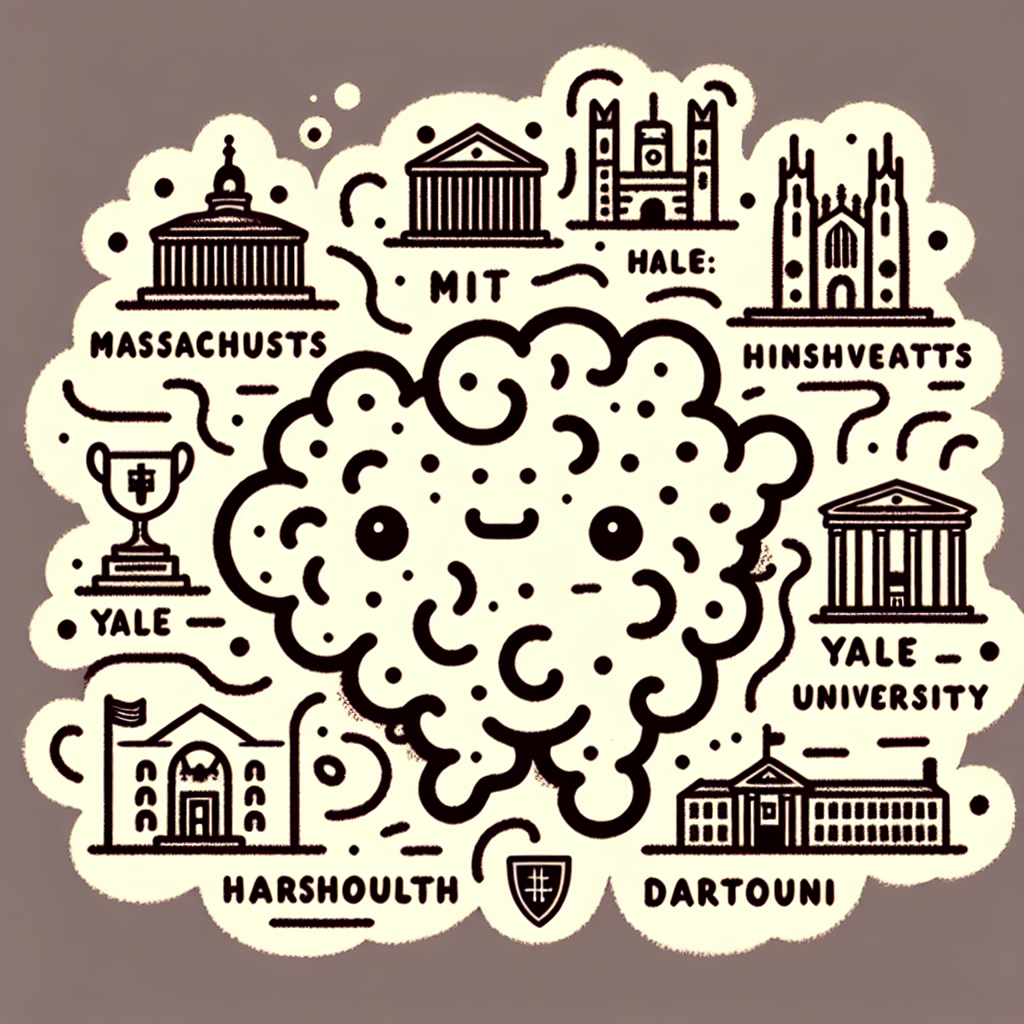Higher Education Landscape in New England
New England is home to a diverse and expansive array of higher education institutions. With over 250 accredited colleges and universities, the region boasts a concentration of academic options that includes some of the most prestigious schools in the country.
More than 1 million students enroll in colleges in New England each year, making higher education a significant part of the region's demographic and economic landscape.
Source
The types of institutions across New England are varied and serve a wide range of academic interests and career paths:
- Research Universities: These include globally recognized names like Harvard University and the Massachusetts Institute of Technology (MIT), known for their advanced research programs and graduate studies.
- Liberal Arts Colleges: Schools such as Amherst College and Bowdoin College offer broad-based undergraduate education with a focus on critical thinking and interdisciplinary learning.
- Community Colleges: Offering two-year degrees and certificate programs, these institutions provide affordable and accessible education across the region.
- Technical and Vocational Schools: These schools focus on career-oriented training in fields such as healthcare, trades, and information technology.
- Specialized Institutions: New England also hosts unique offerings like music conservatories and art schools that cater to specific talents and professional goals.
Colleges in New England reflect a comprehensive educational ecosystem, accommodating a wide range of academic pursuits and student needs.

🏆 Academic Excellence and National Rankings
Colleges in New England are renowned for their academic excellence and consistently high national rankings. Leading the pack are the Massachusetts Institute of Technology (MIT) and Harvard University, which ranked #2 and #3 respectively in the 2024 U.S. News & World Report rankings. These institutions set a high benchmark for academic achievement and innovation.
Source
Other top-performing colleges in New England include Yale University in Connecticut, Brown University in Rhode Island, Dartmouth College in New Hampshire, and Tufts University in Massachusetts. These schools consistently place in the top 50 nationally, further highlighting the region’s strong reputation for higher education. This concentration of excellence makes colleges in New England a compelling choice for students seeking rigorous academics and prestigious credentials.

Affordability and Financial Aid Options
Cost is a major factor for many students considering colleges in New England. Fortunately, the region offers a range of financial aid options to help make higher education more accessible.
Tuition Break Program
The New England Board of Higher Education’s Tuition Break Program allows residents of New England states to pay reduced tuition when enrolling in approved programs at out-of-state public colleges within the region. This program can significantly lower the cost of attending colleges in New England for students pursuing specialized majors not offered in their home state. Source
Scholarships and Grants
Students attending colleges in New England have access to various forms of financial aid, including institutional scholarships, need-based federal Pell Grants, and merit-based awards. Colleges in the region typically offer robust aid packages to both in-state and out-of-state students, depending on eligibility and academic performance.
Community College Affordability Initiatives
Several New England states have introduced initiatives to make community college more affordable. For example, Massachusetts’ MassReconnect program offers free community college tuition to qualifying residents, particularly targeting older adults returning to school. These efforts aim to reduce financial barriers and increase access to higher education across the region.

🌱 Sustainability and Campus Initiatives
Green Campus Leadership
Among colleges in New England, Bates College in Maine stands out for its environmental achievements. In 2019, Bates became carbon neutral, a milestone that reflects its long-standing commitment to sustainability. Notably, 96% of the campus's energy comes from renewable sources, setting a high standard for peer institutions Source.
Other Sustainable Colleges
Middlebury College in Vermont and College of the Atlantic in Maine are also recognized leaders in sustainability. Middlebury has invested heavily in renewable energy and carbon reduction strategies, while College of the Atlantic was the first college in the U.S. to become carbon neutral, underlining its environmental focus.
Campus Sustainability Programs
Across New England, many colleges integrate sustainability into daily campus life. Common initiatives include:
- LEED-certified buildings that meet high standards for energy efficiency and environmental design
- Composting and recycling programs that reduce waste and promote circular resource use
- Green transportation options, such as bike-share systems, electric vehicle charging stations, and campus shuttles powered by biodiesel
These efforts reflect a broader trend among colleges in New England to prioritize environmental responsibility and lead by example in the fight against climate change.

💼 Economic and Social Impact
Colleges in New England play a significant role in driving the region’s economy and enriching its communities. Their impact extends beyond academics, contributing to innovation, job creation, and public service.
Research and Innovation
In FY2023, colleges in New England received $4.83 billion in NIH awards, fueling groundbreaking research and technological advancement across various disciplines. These funds support faculty, students, and research infrastructure, reinforcing the region's leadership in health and science innovation.
Source
Job Creation and Local Economies
NIH funding to colleges in New England also supported over 40,000 jobs and generated $10.65 billion in economic activity. This includes employment in research roles, administrative support, and related industries such as construction and technology that benefit from university contracts and spending.
Source
Community Engagement
Beyond economic contributions, colleges in New England engage directly with their communities. Many institutions collaborate with local governments and nonprofits to provide:
- Free health clinics and legal aid services
- Adult education and English as a Second Language (ESL) programs
- Public lectures, art exhibitions, and cultural events
These initiatives enhance quality of life and foster stronger community ties throughout the region.

Student Life and Campus Culture
Colleges in New England offer a vibrant and diverse student life that reflects the region's rich educational heritage. From inclusive communities to dynamic extracurricular activities, students experience a well-rounded campus culture.
Diversity and Inclusion
Many colleges in New England have made significant investments in promoting equity and belonging. Dedicated centers support BIPOC students, LGBTQ+ communities, and first-generation college students. These centers often provide mentorship, advocacy, and programming that fosters a sense of community and personal development.
Athletic and Extracurricular Activities
Athletics are a key part of student life at colleges in New England. NCAA Division I, II, and III sports programs are prevalent, and students also participate in intramural leagues and club sports. In addition to athletics, campuses host a wide range of student-run clubs, academic organizations, and Greek life, offering students numerous ways to get involved and build leadership skills.
Arts and Culture
New England colleges are well-regarded for their arts and culture scenes. Many institutions have renowned arts programs and support student-led theater productions, music ensembles, and dance groups. These cultural activities provide creative outlets and contribute to a lively and artistic campus environment.

🗺️ State-by-State Overview
Massachusetts
Massachusetts is a cornerstone among colleges in New England, boasting over 100 institutions of higher learning. It's home to globally recognized universities such as Harvard University, the Massachusetts Institute of Technology (MIT), and Boston University. The state's dense academic environment offers a wide range of opportunities across disciplines, from liberal arts to cutting-edge scientific research.
Connecticut
Connecticut features some of the most prestigious colleges in New England. Yale University, a member of the Ivy League, sets the academic tone for the state. The University of Connecticut (UConn) complements this prestige with strong public research programs and a large student body, making Connecticut a balanced hub of private and public education.
Rhode Island
Despite its small size, Rhode Island contributes significantly to the landscape of colleges in New England. Brown University, an Ivy League school known for its open curriculum, and the Rhode Island School of Design (RISD), a leader in art and design education, attract students from around the globe.
Maine
Maine is known for its focus on liberal arts education within the broader network of colleges in New England. Institutions like Bowdoin College and Bates College emphasize small class sizes, undergraduate research, and a strong sense of community, all set against a scenic New England backdrop.
Vermont
Vermont stands out among colleges in New England for its environmentally conscious institutions. Middlebury College, for example, is renowned for its commitment to sustainability and global studies. The state's higher education offerings often blend academic rigor with strong environmental and social values.
New Hampshire
New Hampshire is home to Dartmouth College, an Ivy League institution with a strong emphasis on undergraduate education and research. The University of New Hampshire serves as the state’s flagship public university. Together, these schools represent the academic diversity and quality that define colleges in New England.

Future Trends and Challenges
Enrollment Fluctuations
Colleges in New England are facing significant enrollment challenges due to changing demographics and increasing tuition costs. As the population of traditional college-age students declines in the Northeast, institutions must adapt their recruitment strategies and consider non-traditional student populations to maintain enrollment numbers.
Emphasis on Online Learning
In response to evolving student needs, many colleges in New England are expanding their online and hybrid learning offerings. This shift allows institutions to reach a broader audience, including working professionals and remote learners, while also enhancing flexibility and accessibility.
DEI and Mental Health Initiatives
Colleges in New England are intensifying their efforts around diversity, equity, and inclusion (DEI), as well as student mental health support. These initiatives include expanded counseling services, inclusive campus programming, and dedicated DEI offices aimed at fostering a supportive learning environment.
Sustainability & Climate Commitments
Many colleges in New England are committing to sustainability goals, with several pledging to achieve carbon neutrality within the coming decades. These institutions are also incorporating climate education into their curricula and investing in green infrastructure to reduce environmental impact.

Conclusion
Colleges in New England continue to exemplify academic excellence, forward-thinking innovation, and a deep commitment to sustainability. The region is home to some of the most prestigious institutions in the world, known for rigorous academics and influential research. In addition to their reputations, these colleges offer a variety of financial aid options, making higher education more accessible to students from diverse backgrounds. New England colleges also demonstrate a strong dedication to creating positive social and economic impacts through community engagement and global initiatives. As a result, students from around the world are drawn to colleges in New England for opportunities that are both academically enriching and socially meaningful.







.png)






